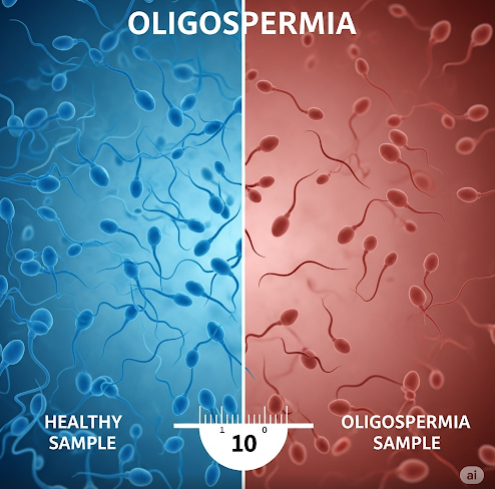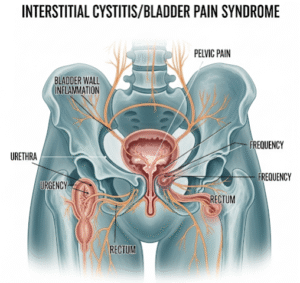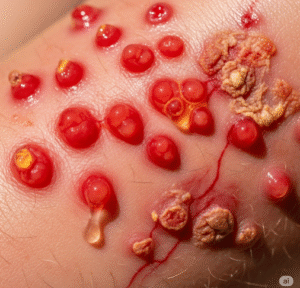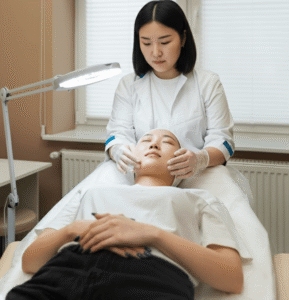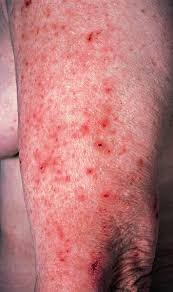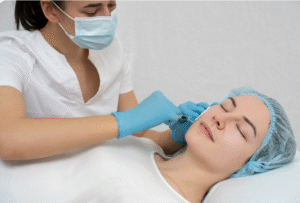Overview
Oligospermia, also known as low sperm count, is a male fertility issue where the semen contains fewer sperm than normal. A healthy sperm count is essential for natural conception, and oligospermia can significantly reduce the chances of fertilizing an egg. While it doesn’t necessarily mean infertility, it can make it more difficult for a couple to conceive. The condition can be temporary or persistent and may be caused by various lifestyle, medical, or environmental factors.
What is Oligospermia?
Oligospermia is defined as having a sperm concentration of fewer than 15 million sperm per milliliter of semen, according to World Health Organization (WHO) guidelines. It is one of the most common causes of male infertility. Oligospermia is categorized based on severity:
- Mild: 10–15 million sperm/mL
- Moderate: 5–10 million sperm/mL
- Severe: Less than 5 million sperm/mL
It can occur alone or alongside other semen abnormalities, such as low motility (asthenozoospermia) or abnormal morphology (teratozoospermia).
Symptoms
Oligospermia itself often has no visible symptoms and is usually discovered during fertility testing. However, underlying causes may present with:
- Difficulty conceiving a child after 12 months of unprotected intercourse
- Low sex drive
- Erectile dysfunction
- Pain or swelling in the testicular area
- Decreased facial or body hair (suggesting hormonal imbalance)
- Other signs of hormonal or genetic disorders
Causes
Several factors can lead to a low sperm count, including:
- Varicocele (enlarged veins in the scrotum)
- Hormonal imbalances (low testosterone, pituitary issues)
- Infections (e.g., epididymitis, mumps orchitis)
- Ejaculation issues (e.g., retrograde ejaculation)
- Undescended testicles
- Genetic conditions (e.g., Klinefelter syndrome)
- Exposure to toxins (pesticides, heavy metals)
- Overheating of the testicles (e.g., from saunas or tight clothing)
- Lifestyle factors such as smoking, alcohol, drug use, obesity, or stress
Risk Factors
You may be at higher risk for developing oligospermia if you:
- Are over the age of 40
- Have a family history of fertility issues
- Use anabolic steroids or recreational drugs
- Have experienced trauma or surgery to the genital area
- Are frequently exposed to environmental toxins
- Have untreated infections or chronic illnesses
Complications
The main complication of oligospermia is reduced fertility. Other potential issues include:
- Emotional and psychological stress related to infertility
- Marital or relationship strain
- Need for assisted reproductive technologies (ART)
- In rare cases, underlying health conditions such as tumors or genetic disorders
Prevention
While not all causes of oligospermia are preventable, several steps can help maintain healthy sperm production:
- Avoid tobacco, alcohol, and recreational drugs
- Maintain a healthy weight and balanced diet
- Exercise regularly but avoid excessive intensity
- Protect the testicles from heat and trauma
- Avoid exposure to environmental toxins and chemicals
- Manage stress levels and get adequate sleep
- Seek early treatment for infections and medical issues
Treatment Options in Korea
South Korea is a global leader in fertility and reproductive health, offering advanced diagnostics and treatment options for male infertility, including oligospermia. Treatments vary depending on the cause and severity and may include:
- Varicocele repair surgery: Microsurgical techniques to correct varicoceles
- Hormone therapy: To address hormonal imbalances and stimulate sperm production
- Lifestyle changes: Nutritional counseling, weight loss, and stopping harmful habits
- Antibiotic treatment: For infections that affect sperm health
- Assisted reproductive technologies (ART): Such as intrauterine insemination (IUI) or in vitro fertilization (IVF), often with intracytoplasmic sperm injection (ICSI) in severe cases
- Sperm retrieval procedures: For cases with very low or absent sperm count
Top fertility centers in Korea, such as CHA Fertility Center, Maria Fertility Hospital, and Seoul National University Hospital’s Andrology Clinic, offer comprehensive male fertility evaluations and personalized treatment plans with high success rates, supported by world-class laboratories and experienced medical teams.

